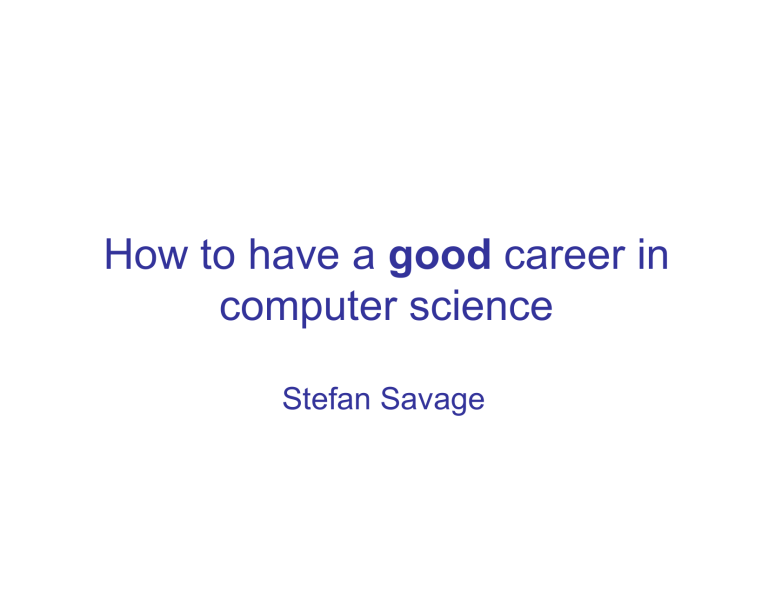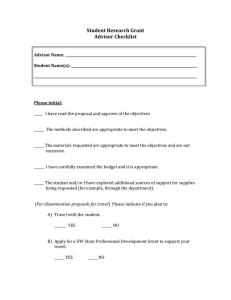good computer science Stefan Savage

How to have a
good
career in computer science
Stefan Savage
First…
• Who am I? (why should anyone believe me?)
• This is advice , not a rulebook (ask around)
• This mostly isn’t about doing good research
(you need to do that too)
• Please interrupt and ask questions
2
Today’s problem statement
• Input: N years of your effort
• Goal: you get a job
– Mainly focused on academic or industrial research, but applies for all jobs
• Problem: what should you do during those
N years to maximize your job options?
3
What do
you
think is important?
• Research quality?
• Who your advisor is?
• Problem selection?
• Being able to hack?
• What school you come from?
• Story-telling?
• Being able to prove theorems?
• Publications?
• Who you know?
• Speaking and writing skill?
• Thesis?
4
Getting a job: top down
• How do you get a job?
– You interview (1-2 days)
– Give a great talk on fascinating new research
– Impress everyone in one-on-ones
– Various political issues outside your control
• How do you get an interview? (in order)
1. The people there already like you
2. You have great letters from leaders in field
3. You have publications in great places
4. Other…(a very hard place to be)
5
• Networking
• Communications
Today
• Research issues
• Misc tips
6
Networking
(not packets, but people)
• It’s not who you know, it’s who knows you
• Myth: your work speaks for itself (and you)
– Little Reality #1: most people haven’t read your publications (feel lucky if they skimmed it)
– Little Reality #2: many people attending your talk were gossiping in the hall or didn’t listen
• Reality : it is your responsibility to be “known” to your community, not their responsibility to know you
– But your advisor, friends and colleagues can help
7
Networking at conferences/workshops
• Show up
– Go to the top conference in your field each year
(even if you have to pay some/all of your own way!)
• Become visible
– Spend time with people from outside UCSD
– Grad students from other schools. Why?
– Faculty/researchers from elsewhere
– Your advisor, friends can help (how?)
• Learn to have a conversation
– There are interesting topics outside your research
– Do not be arrogant , but don’t be a pushover either
• Follow-up
8
Networking via research internships
• Do them if you can (why?)
– Learn about other research, ways of doing things
– Get strong external letter
– Be introduced to wider group of people in your community
– Ok to even do 2-3 (best not in last couple years)
• Plan to write a paper on what you did (even if you have to do all the work)
• If you have choices pick based on mentor and not based on project
– Keep in touch with your mentors
(and fellow interns)
• BTW, you’ll make a pile of $$$ vs TA/GSR
9
Networking at home
• Other faculty
– You will need 3-5 letters, yet you don’t have
3-5 advisors… hmmm?
– Go to seminars in your area regularly; introduce yourself to other faculty; if your advisor is amenable do a project with another faculty member
• Other students
– Leave your lab
– The senior grad student down the hall may be on the hiring committee at some school in two years
– You have to know more than just your field
• Visitors
– Go to distinguished lectures in any area (why?)
– If there is a chance to meet visitors in your area, do it 10
Communications issues
• Myth : great research shines through
• Reality : great communications skills are as important (if not more so) than research
• Key issues
– Story-telling
– Writing
– Presentation
11
Storytelling
• All papers and talks are first and foremost exercises in storytelling
– How should you think about my problem?
– Why should I care about the problem?
– Why should I care about your solution?
– Must grab attention without being arrogant
• This isn’t just sophistry: the story is a
HUGE part of the academic contribution
– Example: RAID
• Terribly under-rated in importance…
12
Beginning story-telling tips
• Figure out what kind of paper you’re writing
• Find good examples of that kind of paper
– Ask around if you’re not sure
• Try to understand (or copy) the approach taken by those exemplars
13
Newell’s kinds of theses
(applies equally well to papers)
• Opens up new area
• Provides unifying framework
• Resolves long-standing question
• Thoroughly explores an area
• Contradicts existing knowledge
• Experimentally validates theory
• Produces an ambitious system
• Provides empirical data
• Derives superior algorithms
• Develops new methodology
• Develops a new tool
• Produces a negative result
14
Other paper philosophies
• Butler Lampson: three “kinds” of papers to strive for
– First paper
– Best paper
– Last paper
• Andy Tannenbaum’s rule
– One key idea per paper; more can be confusing and less is worthless
15
Intros: writing and presentation
• The Intro is perhaps the most important parts of any paper/presentation
– Sets context
– Explains how to look at the problem
– Presents most impressive result
– Keeps interest of reader in the first minute/page
• What needs to be in there
– Why does anyone care about this problem?
– What is done currently?
– What is your key insight into improving it?
– How much better are you making it?
16
Writing
• Writing is absolutely critical
(by far, easiest way to get your paper rejected)
• Read Strunk and White
• Read examples of well-written papers in your field
• Think about writing in three pieces:
– Introduction (sells the story)
– Organization (what is beginning, middle, end)
• What does each section need to demonstrate ?
• How is it linked to its neighboring sections?
– Paragraph structure within each section
• Transition, context, meat, resolution, segue
• You must practice
– Multiple drafts; write routinely and throw it away
– Try not to get in the habit of letting your advisor write your papers
17
– Get help from other students or from other campus resources
Common writing mistakes
• Writing like you speak
• Bad segues (why did the last paragraph end)
• Flat introduction (most important part of paper)
• Don’t define terms (what’s a quatloo again?)
• Don’t mention limitations or hide weaknesses (kick me)
• Aren’t clear what’s been done vs what could be done
• Related work (not researched, or dumps on everyone)
• No spell check or grammar check
• One draft and ship it
• Run-on sentences
• Passive voice
– Experiments have been conducted to test the hypothesis (passive)
– We conducted experiments to test the hypothesis (active)
18
Presentation
• Critical – easiest way to not get a job after getting an interview
• Need to condense story into 20-30min (paper talk) or 50min (job talk) slot
• Need to hold interest and not lose people, yet clearly do something important and hard
• But can’t possibly cover all details
• Need to speak clearly, concisely and confidently
• Then people will try to tear you down (Q&A)
19
Presentation Tips
(mostly from David Patterson)
• Use illustrations – minimize text (this is a bad talk BTW)
• Be concise in using text (no sentences)
• Use large type (24 point min)
• Use color to separate features
• Skip slides if you need to (figure out which ones you can skip in advance)
• Do not over-animate (only use animation of it helps understanding)
• Allocate 2 minutes per slide and leave time for Q&A
• Humor – but only if you’re funny (its not up to you)
• Go to other people’s practice talks
• You
MUST practice in front of real people – multiple times!
• Video – if you’re hardcore
20
Q&A issues
• Do practice Q&A – really… do this.
• Prepare backup slides around obvious questions
• Make sure you understand the question before you answer
• If you don’t know the answer, don’t make one up – ever .
• Prepare how to handle tough questions:
– Questioning the premise
– We did it at IBM in the 1950s
– I believe there is a flaw in lemma 6
– How is this different from xxx?
• Learn how to defer
• If you’re very funny, learn how to use humor to diffuse
21
Quick aside: personality
• Personality issues count
– Likeable/admirable people get better support
– From employers, advisors, colleagues, etc
• We all have personality defects
– Arrogant, undermotivated, underappreciative, martyr complex, gossip, loner, mean-spirited, unempathic, immature, poor sense of humor, sycophant, manipulative, etc
– Learn to know yours and try to improve…
– More than anything else learn to be modest, gracious and hard-working
• Screwing up on these can be career-limiting
22
Research issues
• Topic selection
– Pick a topic that someone cares about
– Improvement on known problem vs new problem (how to demonstrate innovation)
– Short term vs long term (tradeoff)
– Track technology trends and changes
– What is your secret weapon or unfair advantage?
• Problem definition
– Avoid LPUs
– But don’t need to solve everything in one paper (art)
• Publications
– Venue more important than quantity
– Collaboration is good, not bad
23
Quick aside: collaboration
• Myth: I shouldn’t work with other students because then I have share the credit
– This is a HUGE mistake
• Reality:
– Huge multiplier in publication (breadth, quantity and quality)
– Provides more opportunities to learn
– More opportunities to impress faculty (remember those 3-5 letters)
– Moreover, in industry and labs, working in a group is the norm – people look for this
24
Research issues #2
• How long on a problem?
– Your approach will have flaws (don’t give up)
– Don’t follow a rat-hole forever (no results for a year is a big warning sign)
• Methodology
– Be rigorous in your evaluation
– Strive to do realistic evaluations
(counter-example: economic computer virus analysis)
• This may mean implementing something!
• Or at least get real data!
– Experimental fields: especially true
– Most compare to best known work
25
Meta issue:
Understanding your community
• You need to understand your community, both for selling your research and for networking
• What is a community?
• Who are the leaders in your community
– Whose papers get published?
– Who is on the PC?
– Who is being cited?
• What are the hot/contentious topics?
– Read the last two proceedings of the top conferences
– Ask around which were the best papers
– Ask why? Do you agree?
– Join community mailing lists and organizations 26
Graduate Career Pitfalls
• I need the most famous advisor
• I rule (arrogance)
• I suck (self-deprecation)
• Wait for advisor to tell you what to do (XXX)
– Be assertive about what you need
• Follow advisor’s advice blindly
– Need to be able to argue with advisor
• I need to do great work from day #1
• I need to work solo/carve out my niche on day one
– Group projects help your career
– Counterpoint: be careful with very large group projects (2yrs+)
• Not honest with self about career prospects
27
Other resources
• http://www.cs.berkeley.edu/~pattrsn/talks/
BadCareer3.ppt
• www.cs.berkeley.edu/~pattrsn/ta lks/writingtips.html
28
Questions?
29


